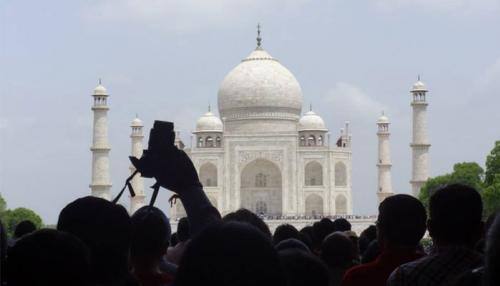- News>
- Uttar Pradesh
Taj Mahal was actually `Tejo Mahal`, had shivling, claims BJP MP Vinay Katiyar

BJP MP Vinay Kaityar has said that the Taj Mahal was known as `Tejo Mahal` and had a shivling,
Ayodhya: The controversy over Taj Mahal refuses to die down, and now a senior BJP MP has claimed that the Mughal mausoleum was actually a Hindu temple and that its named should be changed.
BJP MP Vinay Kaityar said that the Taj Mahal was known as 'Tejo Mahal' and had a shivling, which was later removed from the monument.
“It was Tejo Mahal, Lord Shiva’s temple, where Shahjahan buried his wife and turned it into a mausoleum,” Katiyar, who had been in the forefront of the Ram temple movement of Ayodhya, claimed.
“It was constructed by Hindu kings, the rooms and carvings there prove that it was a Hindu monument… it has also been termed as one by historian PN Oak,” he claimed.
The firebrand BJP lawmaker said like a Shiva temple, water drips from the ceiling in the Taj Mahal, which is not a case in any mausoleum anywhere and is like that only on a Shivlinga.
“It was a famous monument and was grabbed by Shahjahan,” Katiyar said.
“It was our temple but was made a mausoleum as they had more power. But it is a grand monument and national heritage… people come to see it and so it should be kept safe and secure,” he said.
Katiyar, who is also an accused in the Babri case, said no political meaning should be derived from UP Government's grand Diwali celebrations in Ayodhya.
“The aim is to develop Ayodhya…the effort is to recreate the scene of Lord Ram’s return to Ayodhya from exile,” Katiyar said, adding there is no politics behind the function as seen by the opposition.
Earlier on Tuesday, Uttar Pradesh Chief Minister Yogi Adityanath gave a clear snub to his BJP colleague and MLA Sangeet Som for stirring the Taj Mahal controversy, stating that "it does not matter who built it and for what reason; it was built by blood and sweat of Indian labourers".
Som had courted controversy on Sunday, stating that the iconic Taj Mahal was built by traitors and hence, cannot be included in the Indian history.
In an important development, the Taj Mahal, which has been in the crosshairs of controversy, found a place of pride in the 2018 calender brought out by the Uttar Pradesh government.
The 17th century architectural marvel has now been included in the month of July in the calendar brought out by the State Information Department, days after it was not included in the UP Governent's newly released Tourism Booklet.
With ANI inputs
